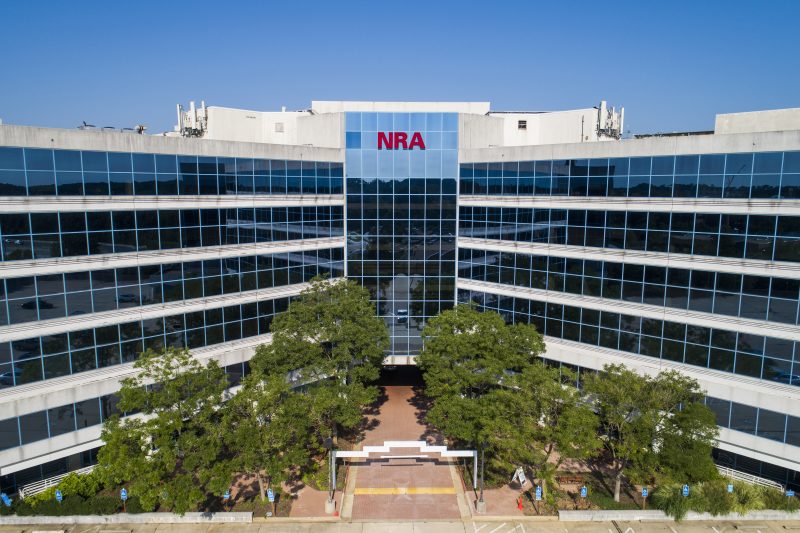The Supreme Court on Monday heard arguments in a case in which the National Rifle Association accused a former New York state official of improperly pressuring banks and insurers to cut ties with the gun-rights group after the Parkland, Fla., high school massacre in 2018.
The case could have significant implications for free speech and how government officials weigh in on contentious topics. The NRA has argued that the official took aim at the group for its speech, violating the First Amendment, while the official countered that she was acting properly in enforcing the law and expressing her policy views.
In an unusual twist, the NRA is represented by the liberal American Civil Liberties Union, which says the group’s’ speech was undeniably targeted.
The NRA says that as head of the New York State Department of Financial Services, Maria T. Vullo leaned on insurers to break with the NRA and used her significant authority over banks and insurance firms to compel them “to blacklist an organization because she opposes the organization’s political speech.”
Vullo allegedly violated the First Amendment by, among other things, sending official guidance letters to the banks and insurers after the Parkland shooting encouraging them to review relationships they had with it or similar gun-rights organizations, the NRA said. The group also says Vullo investigated NRA-endorsed insurance policies and suggested to insurers that they could avoid liability for other issues if they cut ties with the NRA.
In court filings, Vullo’s attorneys disputed the claim that she improperly coerced firms into breaking with the NRA. Her attorneys said the insurance products at issue broke New York law and posed “a serious and unique risk to public safety,” so it was reasonable for Vullo to prioritize them. And they pushed back on the suggestion that the NRA’s speech was targeted or hindered.
“The NRA alleges that Vullo interfered with its relationships with insurers and banks, limiting only what the NRA could do, not what it could say,” her attorneys wrote. “The NRA has never claimed, much less plausibly so, that it was unable to exercise its speech rights.”
Both sides have warned of a dangerous precedent if the other emerges victorious. Vullo said accepting the NRA’s arguments here “would chill speech necessary for a functional government,” because public officials would be kept from making any critical comments that could be “recast as retaliation.”
The NRA, meanwhile, said Vullo’s side would effectively “give government regulators free rein to selectively target unpopular speech” — and warned that state officials could then take aim at any number of political opponents, including abortion rights groups or environmental organizations.
“If New York can do this to the NRA, Texas or Florida could use the same tactics against groups advocating immigrants’ rights, the right to abortion, or other vital civil liberties,” David D. Cole, the ACLU’s legal director, said in a statement Monday.
Arguing on the NRA’s behalf Monday, Cole said Vullo’s actions crossed a clear line and abused her office’s power.
“Government officials are free to urge people not to support political groups they oppose,” Cole said during the arguments. “What they cannot do is use their regulatory might to add ‘or else’ to that request.”
Justice Samuel A. Alito Jr. said Monday that there was a spectrum to weigh when considering instances when government officials urge a person or entity to act. He described an official at one end of the spectrum with significant power ordering someone to act or face significant punishment, and an official at the other end with no real authority making a suggestion.
“In between, there are a lot of different gradations,” he said. “So how do you define when it goes too far along that line?”
Cole answered by saying one important factor is how much power the official involved has over the person or entity they are addressing. But ultimately, he said, the question is whether “a reasonable person” would feel that the request suggests a threat or consequence.
Neal K. Katyal, an attorney for Vullo, urged the justices not to accept the NRA’s claims, saying that would only empower other lawsuits that would hinder valid government enforcement actions.
The NRA is “seeking to weaponize the First Amendment and exempt themselves from the rules that govern you and me, simply because they’re a controversial speaker,” said Katyal, who was acting solicitor general under President Barack Obama.
In a statement after arguments, Katyal said a decision favoring the NRA “would fundamentally inhibit government speech on virtually any topic” and “empower a limitless set of claims against the government based on empty arguments that any regulatory or enforcement action penalizes the speech of the regulated.”
The NRA case is vitally important, because a broad ruling could force government officials to back away from public debate, said Alex Abdo, litigation director for the Knight First Amendment Institute at Columbia University.
“On the one hand, we don’t want the government to be able to threaten … others to carry out its censorship,” Abdo said. “On the other hand, we need a government empowered to be able to participate in public debate about the important issues of the day.”
Not all observers are convinced this is a free-speech issue, however. Dru Stevenson, a professor at the South Texas College of Law Houston, who signed on to an amicus brief in the case supporting Vullo, said her letters did not threaten anyone and were only urging firms to review their ties to the NRA due to the possible reputation risk involved.
Stevenson said he and other law professors who focus on “the nerdy subject of regulatory law” are unnerved by the case because issuing “this type of guidance is an everyday occurrence for regulators.”
The case is NRA v. Vullo.

